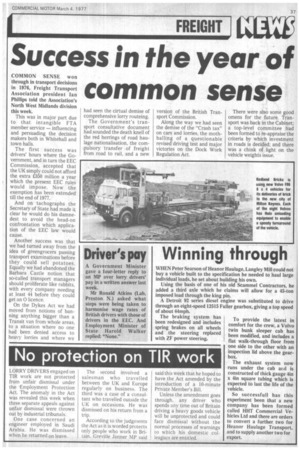Success in the year of common sense
Page 43

If you've noticed an error in this article please click here to report it so we can fix it.
COMMON SENSE won through in transport decisions in 1976, Freight Transport Association president Ian Phillips told the Association's North West Midlands division this week.
This was in major part due to that intangible FTA member service — influencing and persuading the decision makers both in Whitehall and town halls.
The first success was drivers' hours where the Government, and in turn the EEC Commission, accepted that the UK simply could not afford the extra 050 million a year which the present EEC rules would impose. Now the exemption has been extended till the end of 1977.
And on tachographs the Secretary of State had made it clear he would do his damnedest to avoid the head-on confrontation which application of the EEC law would cause.
Another success was that we had turned away from the idea of greengrocers passing transport examinations before they could sell potatoes. Equally we had abandoned the Barbara Castle notion that so-called transport managers should proliferate like rabbits, with every company needing at least 44 before they could get an 0 licence.
On the Dykes Act we had moved from notions of banning anything bigger than a Transit van from whole areas, to a situation where no one had been denied access to heavy lorries and where we had seen the cirtual demise of comprehensive lorry routeing.
The Government's transport consultative document had sounded the death knell of the red herrings of road haulage nationalisation, the compulsory transfer of freight from road to rail, and a new version of the British Transport Commission.
Along the way we had seen the demise of the "Crash tax" on cars and lorries, the mothballing of a questionable revised driving test and major victories on the Dock Work Regulation Act. There were also some good omens for the future. Transport was back in the Cabinet; a top-level committee had been formed to re-appraise the criteria by which investment in roads is decided; and there was a chink of light on the vehicle weights issue,


























































































































































